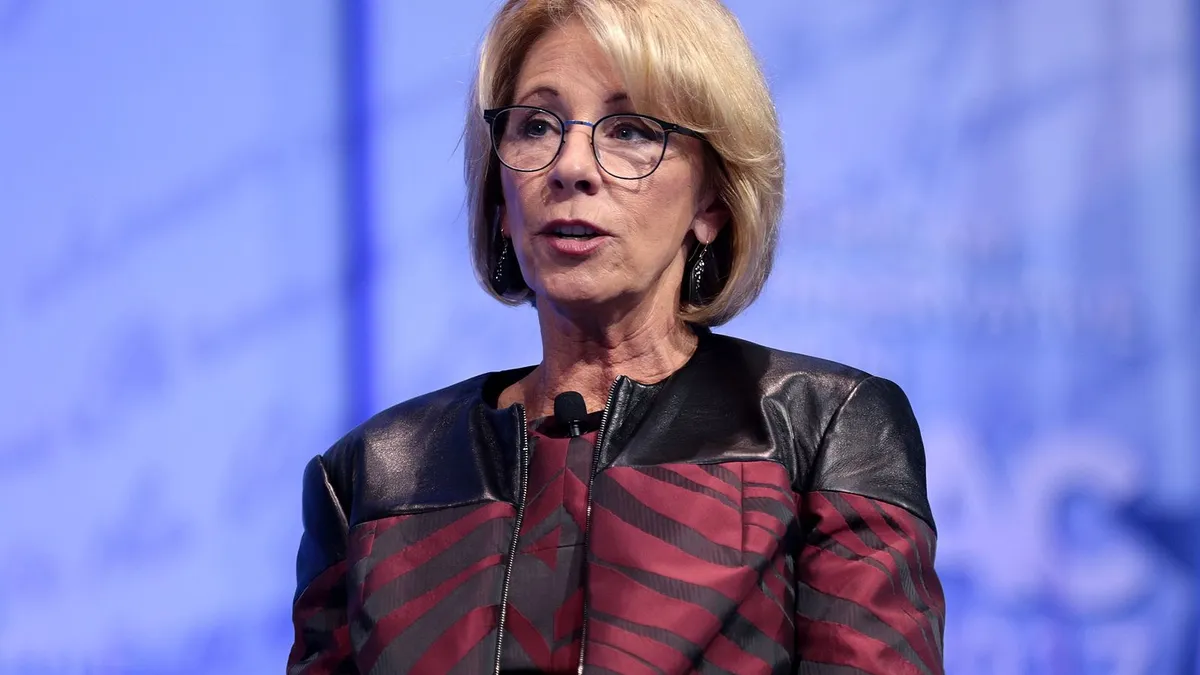Dive Brief:
-
A new U.S Department of Education rule that blocks certain students from coronavirus aid won't apply to colleges in Washington state, a federal judge ruled Friday.
-
The preliminary injunction allows Washington's colleges to distribute Coronavirus Aid, Relief, and Economic Security (CARES) Act emergency grants to many students who don't qualify for traditional student aid. The Education Department has barred students who aren't eligible for Title IV funding from getting funds.
-
The ruling does not erase restrictions in the U.S. Code that the department cited in its rule and that prohibit some international and unauthorized students from receiving public benefits, the judge notes.
Dive Insight:
College administrators and sector lobbying groups fumed when Education Secretary Betsy DeVos in late April issued guidance that limited unauthorized students, including recipients of the Deferred Action for Childhood Arrivals (DACA) program, from receiving emergency grants under the CARES Act.
DeVos didn't announce any restrictions on which students could access the funds when the department began releasing them earlier that month, only that she urged colleges to move quickly to distribute the money.
Critics of the new limits argued DeVos violated congressional intent by shrinking the pool of students who were eligible for the $6 billion worth of grants. California's community colleges and Washington state separately sued the department officials last month over the restrictions. Shortly after, the department posted a notice to its website stating that the guidance was legally unenforceable.
Last week, however, the agency issued an emergency rule enforcing the same limitations but with the force of law: that only students who qualify for federal financial aid are eligible for the grants.
It didn't last long in Washington state. U.S. District Court Judge Thomas Rice on Friday granted a preliminary injunction that stops the rule from taking effect there. However, the rule still applies to the rest of the country when it is published to the Federal Register. That will be as early as Wednesday, according to the department, though it initially said the rule would be posted Monday.
"The harm to students that stems from the eligibility restriction is not only the inability to access (CARES) funds," Rice wrote in his ruling. "The harm is in the inability to access these emergency funds in a timely manner. Absent injunctive relief, students will continue to be denied access to emergency relief funds to which they are likely otherwise entitled."
The department has contended that because the CARES Act references the Higher Education Act, the federal law governing colleges and federal aid, lawmakers only intended the grants to go to eligible U.S. citizens.
Rice noted in his ruling, however, that Congress did write some limitations into the CARES Act. Students who are enrolled solely in distance education courses aren't eligible for grants, but the legislation does not mention the same restrictions on noncitizen students. He also wrote that the department used colleges' enrollment numbers, which include unauthorized students, to calculate how much CARES money they would receive.
One of the department's arguments could have merit, Rice wrote. Congress intentionally excluded "nonresident alien individuals" from the $1,200 relief check that the CARES Act provides, but it did not do so for the emergency grants, Rice noted. This may have been because Congress passed the CARES Act hastily, he wrote, and otherwise meant for the restriction to apply. On the flip side, he cited precedent suggesting that the omission could have been intentional.
Washington state officials celebrated the ruling. The state's Office of the Attorney General said in a statement that the department's decision disadvantaged thousands of college students in the state who "desperately need financial assistance." Among them are not only DACA recipients, the statement notes, but also students who are eligible for federal aid but haven't filed a Free Application for Federal Student Aid (FAFSA), and adults taking basic education courses.
The FAFSA is the easiest way to determine Title IV eligibility, and some observers have said the department's actions will exclude those who haven't filed one. Many colleges will likely ask for students who want grants to fill out a FAFSA, policy experts say.
A decision in the California case is expected soon. In recent court filings, attorneys on behalf of the state's community colleges pushed the court to rule, noting the financial burden students are under.
Responding to the court's request for a statement on the impact of the department's emergency rule, plaintiffs in the California case wrote that "no further briefing is necessary," adding that the rule retreads the department's arguments that have already been debated.
The Education Department did not respond to a request for comment by publication time Monday.










